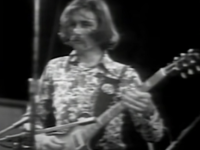To be perfectly honest, I didn’t pick up One Way Out because I’m a huge fan of the Allman Brothers Band. As with 2003’s Hittin’ the Note, I grabbed it because of the presence of slide-guitar monster Derek Trucks and the equally monstrous bassist Oteil Burbridge.
The Allman Brothers Band were one of those groups whose music infiltrated the musical landscape. Still, it was pretty easy to ignore it when I was younger. It was just Southern rock, and all I could see was a bunch of drugged-out hippies sittin’ round jamming on the front porch – complete with that big guy in the overalls hunched over and blowin’ into a jug. Of course, the generalization is wildly inaccurate. On the surface, the Allman Brothers Band may invoke jaded images like that, but upon closer inspection this is music more closely related to the blues and even jazz at times than rock.
How many times have you heard Gregg Allman’s “Midnight Rider”? I know I heard it so often I thought I’d never want to hear it again. And yet somehow the version that arrived on One Way Out on March 23, 2004 was so invigorating that it’s like a new song. Trucks’ slide work howled from your left speakers and, more often than not, I found myself transfixed by his playing. Burbridge’s bass work rarely took center stage, instead burbling insistently in the background and providing a thick, meaty foundation. While the older material may not be the most challenging for such a tremendously talented bassist, every note and lick oozed with evidence of his proficiency.
The tendency for bands like this – bands that are known for their jamming – is to just rely on jamming, period. This has always been my problem: I find that most of the groups who jam simply lack the chops and taste to maintain my interest for long, as they fall back on repetition and simple variations of riffs. Of course, the Allman Brothers Band had perfected the art of jamming long ago, and One Way Out didn’t lack for it. Numerous tracks ventured past the 10-minute mark, but didn’t drag on so long that you forgot what song you’re even listening to.
Along with the hallmark jam “Whipping Post,” the group stretched out on newer tracks like Hittin’ The Note‘s “Instrumental Illness” (16 minutes of it!) and “Desdemona,” but it was the jazzy change-ups of “Woman Across the River” that fascinated me no end. I couldn’t get enough as the Allman Brothers Band slipped from up-tempo to down-tempo blues during the chorus, and then turned it right back around with a catchy little motif that was repeated throughout the tune. I could have listened to a lot more of this than the just under seven minutes provided on One Way Out.
I’ve always been intrigued by the two-drummer system employed by the Allmans. “Why is this necessary?,” I often wondered. On a cursory examination, the drum work appeared to be pretty straight-ahead – and maybe that was simply an unfortunate side-effect of listening to radio hits. But live, the rhythm section was dense and complex, with each drummer filling in around the other. Heck, there was even room for a separate percussionist. You’d think all this drumming would overload the mix, but it didn’t: Butch Trucks (Derek’s late uncle) occupied the right half of the auditory field and Jaimoe filled out the left, with percussion bits peeking out in between the two.
What could be an aural mess was just the opposite: The mix on One Way Out was fantastic – so clear that everyone’s parts were exquisitely defined, as each was given plenty of room and space, and yet it never sounded weak. One Way Out was just plain fun to listen to.
- King Crimson’s Brief But Important Double-Trio Era Peaked With ‘Thrak’ - April 14, 2025
- How David Bowie’s ‘Reality’ Stood Out For What It Was Not - September 29, 2023
- Metallica’s ‘St. Anger’ Was Always Much Better Than They Said - June 8, 2023



